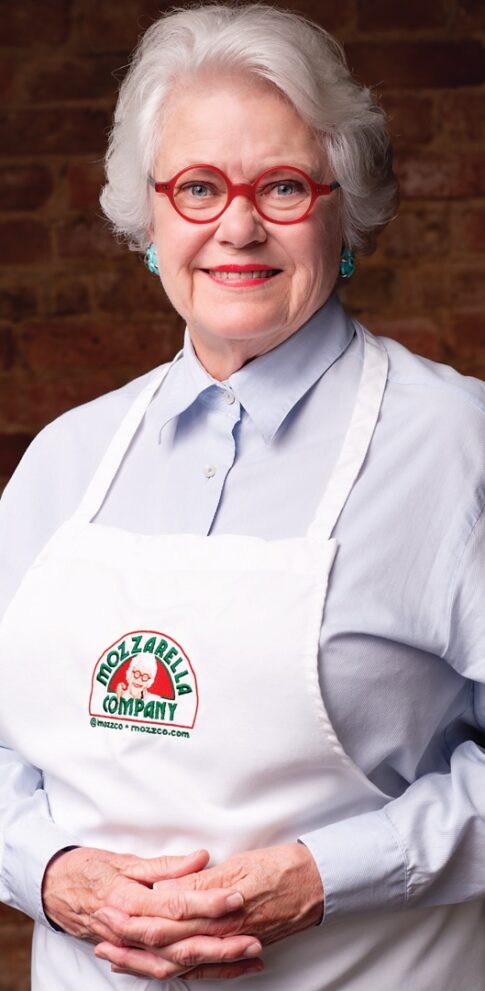
By Taylor Adams Cogan
Unless you’re in development or on the City Plan and Zoning Commission, it’s not usual for people to examine Dallas’ zoning laws and maps. But for one woman in the early 1980s, she was driven to them, all fueled by one thing: Cheese.
“The most important thing for me was to find a location that had zoning that was proper,” says Paula Lambert, who has owned the Mozzarella Company since 1982.
There was a time when this ball of cheese, wrapped in plastic and bearing a red and green label, was our only option for fresh mozzarella. While our options have expanded, Paula has continued to provide Dallas restaurants and eaters a reliable product and a destination for cheesemaking and education.
Before her business landed on Elm Street, Paula lived in Italy, falling in love with everything in the country so much that she wanted to bring its culture of food to her home state.
“I had no background other than I loved to have dinner parties and cook,” she says. “I tried to decide what we didn’t have in Dallas that I had loved in Italy, and I came up with the idea of fresh mozzarella.”
For some here, mozzarella was that stretchy tube inside thick batter they’d dip into a slightly sweet marinara sauce. Then, Paula says, no one had heard of a mozzarella and tomato salad. Sure, you could find it at the Mansion on Turtle Creek, but they were using a craft block and folding it artistically. For a while, anyway.
”I came along, and the Mansion became one of my first customers,” she says. “They knew what fresh mozzarella was.”
Paula says she was “a little pioneer,” and she was — in more than just cheese.
When she looked for the right zoning for her cheese production, her options included the Cedars, around Riverfront Boulevard (then Industrial Boulevard), and the quiet streets of Deep Ellum.
”I went down to the city and looked at the zoning map, and I saw Deep Ellum. Everything was boarded up then: no artists, galleries, restaurants, nothing. Not even a for-lease sign. Everything was being used as a warehouse,” she says.
(Of course, those warehouses would become prime locations for underground parties.)
But she wanted a spot near downtown where she could have a factory that was also pedestrian-friendly. So, she went to her friends who run Rudolph’s Meat Market and Sausage Factory, which had been operating at 2924 Elm St. since 1895.
“They owned the whole block. They told me they had this place down on the corner, and that’s where I started. And that’s where I still am,” she says.
To plan for her opening, she planted a little tree out front — a gift from her Rudolph crew.
”It was a tiny little stick, so I protected that tree the entire time I’ve been there,” she says.
For a while, that simply meant she ran a hose out the door to water it.
”I would give talks about my company, and I would always refer to this tree. It was a symbol of my company: it was growing, my business was doing better,” she says.
Then, there was the movement to beautify the strip of Elm Street: repaving sidewalks, pushing out some curbs, and growing some native plants. There was a variety of reactions to bringing more flowers to this intentionally gritty street, but for Lambert, that symbolic tree was in trouble.
“Eventually, I met with the man who was in charge of the process, and he said we were going to clear out for a complete street and start over, like urban renewal, and I said, ‘You have to save my tree,’ and he said no. He said, ‘The only way you can do it is politically,’” she says.
She went a few different routes, even to a state arborist.
“No one would help me,” she says.
Let’s not forget this is a Texan we’re talking about: She found a way, which, in this case, was through then-Councilmember Adam Medrano.
“He was all for it, and he helped me save that tree,” she says. “They took a lot of care of it during that time.”
You can still see it today outside her business: The healthy sweet gum tree stands strong among the other, city-planted trees.
While you can find her company’s cheese in area grocers and restaurants, Mozzarella Co.’s headquarters is open during the week for shopping and as a destination for cheese and classes.
“I’ve loved being in Deep Ellum, and I loved seeing it develop. I was there five years before the first modern restaurant opened, the Deep Ellum Cafe, the Green Room, all kinds of wonderful things, a lot of wonderful art galleries, and we knew each other. We’d walk up and down the street, go to each other’s places for lunch,” she says. “Deep Ellum has developed so nicely, it’s so totally different from what it was then. It’s gone up and down, and I think it’s very worthwhile.”
She even considers how her business would be if she had planted roots in the Cedars or the Design District, and she knows Deep Ellum was the right choice.
“I hope we can hang on and stay there. We really have not been successful in finding the Deep Ellum residents to come and shop at our factory. Even though there are all these apartment buildings, we cannot reach those people. Maybe it’s because our hours are not compatible — we are a factory,” she says.
“I think it’s so important to be a little place like we are, where people can bring their children, show that people make cheese. I think it’s a place, if you want to come down here and show you can bring friends — it’s a destination,” she says.
Mozzarella Co. was based on little cheese factories in Italy, which Paula learned about decades ago, but she still makes visits to learn more. It’s not uncommon for her to travel with people such as Chef Stephan Pyles.
”All the people I’ve met throughout the years are because of cheese,” she says.
